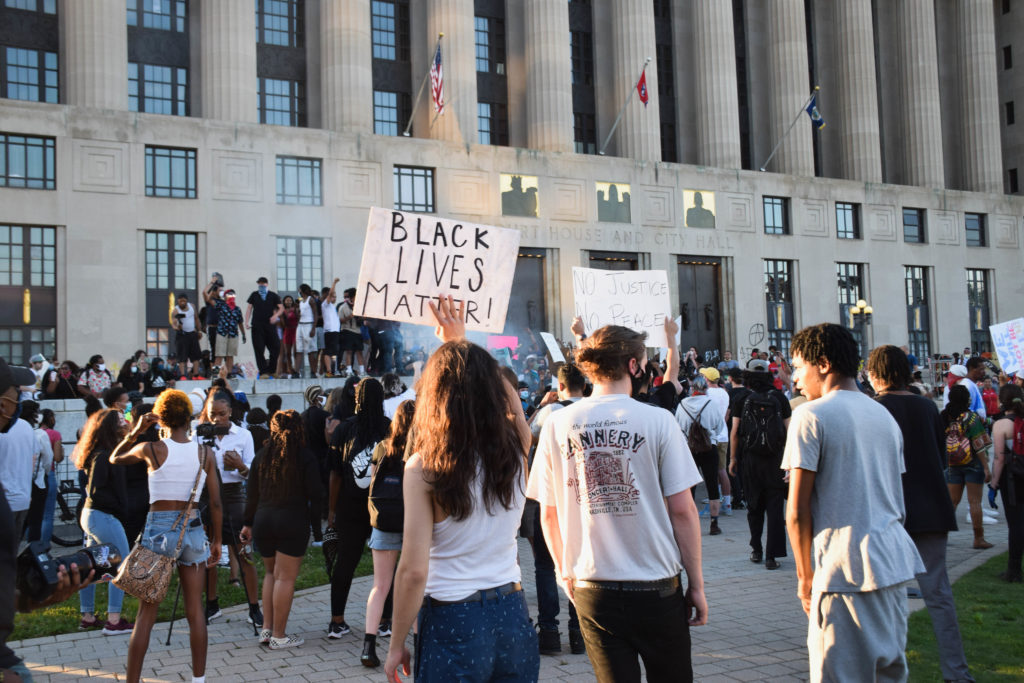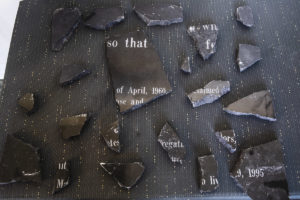
Saturday’s massive rally in downtown Nashville ended with the destruction of a plaque honoring marchers in the Civil Rights Movement on the steps of city hall.
Its symbolic power has gotten a lot of attention from Mayor John Cooper and other city officials. But black activists — young and legendary — are questioning whether the city has made meaningful progress since it was first put up.
The mayor was photographed with shards of the plaque. He’s also mentioned it in three public speeches.
But one of the people honored on the plaque hasn’t been moved.
 Alan Poizner Tennessean / Pool
Alan Poizner Tennessean / PoolA plaque honoring the non-violent demonstrators who marched to the Metro Courthouse after Councilmember Z. Alexander Looby’s home was bombed in 1960 was shattered during protests over the weekend.
“I’m not really willing to spend any time talking about it,” says Diane Nash, the 82-year-old Civil Rights Movement pioneer, whose name is engraved on the plaque.
Cooper has given praise to the peaceful elements of the rally. But he’s spent a fair amount of time focusing on the brief acts of violence, such as the plaque’s destruction — which at times have overshadowed the peace and purpose of the protest.
“I think it’s a mistake to focus on the violence that has taken place,” says Nash. “We could spend that time much better talking about correcting the problem that sparked the demonstrations in the first place.”
By the age of 23, Nash made a name for herself nationwide, as a proponent for nonviolence. The destroyed plaque was made in her honor along with other leaders who fought segregation in Nashville.
Nash says she’s happy to see a new generation responding to injustices — many of which she fought to end decades ago.
“I think that in certain areas we’ve moved ahead significantly, and in other areas I think we are worse off,” says Nash.
This is also the perspective of Rondriquez White, a new-generation organizer whose roots are in North Nashville — a historically black neighborhood with a long pattern of disinvestment.
“There’s one street, named after Rosa Parks of all people, where you can see the divide between the haves and the have-nots.”
The neighborhoods he’s referring to are Buena Vista and Germantown. One side has public housing. The other is booming with investment. This has created an even larger divide between black and white Nashvillians.
“The city’s probably more segregated now than ever before. It’s designed that way,” says White.
White says moving forward, city officials should focus on actions that will bring racial justice. Rather than holding on to markers of past progress.
A ‘false illusion of progress’
Segregation was supposed to end, and blacks were supposed to be given equal rights in 1968. That year the Civil Rights Act was passed, which came days after violent riots broke out in cities across America, following the assassination of Martin Luther King, Jr.
Today, even after the end of segregation — like many other cities — Nashville is far from reconciliation.
Nationally, the unemployment rate for blacks has made nearly no progress in the past decades. The rate was 7.5% in 2017 compared to 6.7% in 1968. This has consistently been twice the rate of white workers. Homeownership has barely budged. Schools are slowly on the path of resegregation, too.
According to a 2018 Economic Policy Institute report, “The share of African Americans in prison or jail almost tripled between 1968 and 2016 and is currently more than six times the white incarceration rate.”
In Nashville, black residents are more than twice as likely to be stopped by police than white residents. By one measure, the city’s 37208 ZIP code also has one of the highest incarceration rates in the country.
“We’ve made this false illusion of progress that we don’t have proof to show for,” says Jeneisha Harris, a 23-year-old activist and Memphis native living in Nashville. “I think we get a little caught up in the accolades and the fact that black people can sit at a counter, go to school, and marry anybody that we want to.”
Harris, who has been arrested more than once for her activism, says over the years she’s found herself sharing similar stories with her Civil Rights Era mentors.
“There’s no reason why we should share the same stories of being arrested for fighting for freedom, rights and survival,” says Harris. “Malcom X has a quote that says, ‘Racism is like a Cadillac. They come out with a new version of it every year.'”

